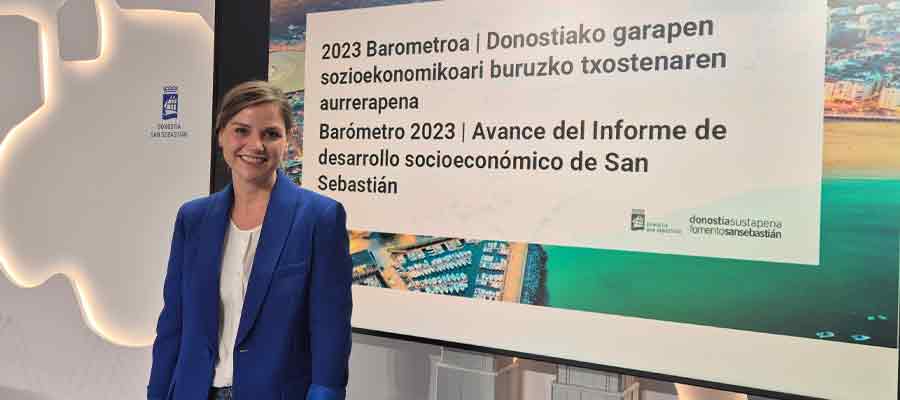- According to the initial data from the 2023 Economic Barometer, unemployment in San Sebastián is below the European Union average at 5.9%.
- An e O ya rbid e: “In 2023 we noted that the city had consolidated economic growth on the basis of a highly qualified tertiary sector, and entrepreneurial activity with 1,600 newly created businesses, primarily focused on R +D “.
Initial data from the 2023 Economic Barometer drawn up by Fomento de San Sebastián confirm that in 2023 the city continued along the path of economic growth, with a year-on-year nominal GDP increase of 5.5% (8,781 million euros and 1.9% growth in real terms), putting per-capita GDP at 46,437 euros (+5.3% year on year), and unemployment at 5.9%. One of the main features highlighted in the course of the year was Knowledge-Intensive Business Services (“SEIC”), accounting for almost half the GDP generated (4,300 million euros), showing a 5.6% increase in the space of only one year.
In terms of jobs, SEIC services have also come to the fore as one of the drivers of employment contracts in San Sebastián. Specifically, this provides jobs for 34,787 people, or 35.5% of the total number of jobs in the city. Another most significant aspect is that 25% of the 1,600 new companies incorporated in 2023 operate in this sector, making San Sebastián Spain’s capital city with a population of over 100,000 with the highest concentration of technology jobs, according to a recent survey conducted by the COTEC Foundation.
These figures point to continued expansion and positioning as a city of science and innovation, with a leap of more than 17% in R+D investment in only one year. Investment in R+D in the city accounted for 3.7% of GDP, outstripping the average figure for the Basque Country (2.0%) and also Gipuzkoa (2.6%), with a ratio of 1,724.4 euros in R+D investment per inhabitant well above the figures for the Autonomous Communities of Madrid (760 €/inhabitant), Catalonia (619 €/inhabitant) and Navarra (617 €/inhabitant).
One specific area to be singled out is biotechnologies, which in our city show some extremely relevant data such as growth in the region of 67% over the last 5 years. This explains the number of contracts in this regard, which rose to 8% in 2022.
Local Economy and Employment Councillor Ane Oyarbide pointed out how important it is for San Sebastián to consolidate benchmark status in science and technology, a sector featuring major investment, and the ability to generate quality jobs and streamline the city’s general economy. “These figures demonstrate that the path we are taking to move the city’s future model of production forward is here and now”, she added.
These kinds of services show considerable productivity, with GDP job ratios in excess of 120,633 euros in the case of SEIC-Corporates, outstripping Basque industry’s average productivity in the same year, 2023 (118,730 €/job).
Lowest unemployment figures in a decade
Fomento’s 2023 Barometer puts people in work in San Sebastián at 82,649, of which 42,049 men and 40,600 women. These figures show unemployment running at 5.9%, as mentioned above. Here it should be pointed out that the Lanbide Employment Population Survey (“PRA”) puts the unemployment rate at 7.6%. In this regard, Local Economy and Employment Councillor Ane Oyarbide said: “we have consolidated some exceptional figures in terms of job market behaviour. We are still the capital city of the Autonomous Community of the Basque Country with the lowest unemployment rate (5.9%), lower than the overall EU percentage of 6.4%. Permanent contracts, moreover, account for half of the total, and employment contracts for women stand at over 50% (56.4%), contracts for young people under 35 years old account for 55.5%, and migrants account for 42.2%”.
The total number of businesses was 15,606. Most of these are small companies with 2 employees or a single employee (72.5%), although a trend has been observed in the expansion and concentration of employment in larger businesses. This is particularly noticeable in the case of the 39 gazelle companies that have doubled their workforce over the last three years. These businesses are usually small, but show a considerable capacity for above-average rapid growth, thanks to their innovative strategy.
Business density in Donostia is quite significant for a medium-sized city (80 businesses for every 1,000 inhabitants), taking it to levels similar to Madrid, and showing a higher density than other provincial capitals with a larger population range such as Bilbao, Sevilla, Málaga and Zaragoza.
Hospitality and retail
The 2023 Barometer shows that the retail sector has 2,418 outlets, and generates 8,547 jobs. 8.7% of jobs are in San Sebastián, and account for 65% of the retail sector in the Greater Donostia area, and 31% of all retail in Gipuzkoa province.
Donostia’s hospitality sector had 1,460 establishments employing 8,689 people in 2023, accounting for 8.8% of the city’s jobs, and generating almost 700 new jobs during this period.
These figures are a preview of the 2023 San Sebastián Economic Barometer which is being drawn up by Sociedad de Fomento and which will shortly be available on its website www.fomentosansebastian.eus.
As the body spearheading economic development through innovation and science, one of the tasks of this publicly-owned municipal corporation is to monitor the city’s economic variables. It does this by drawing up the annual Barometer, alongside other specific surveys and analyses providing exhaustive information to bring its action plan into line with social and economic reality in Donostia.

